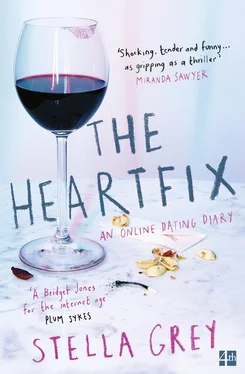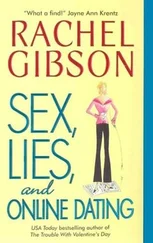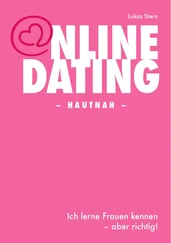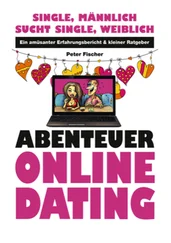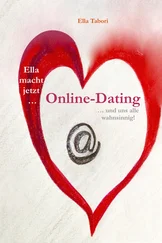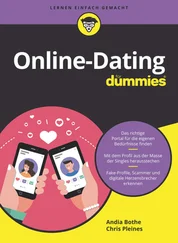His train wasn’t until lunchtime, and we were supposed to be spending the morning together. He texted saying that unfortunately he had to work, so there would only be time for a quick coffee. I met him at a station café. He stood as I approached, but there was no kiss hello. He asked me how I was and said it had all been lovely and we must do it again soon, mustn’t we? I walked with him to the platform, where he said, ‘Bye, love,’ as he got into his carriage, kissing my cheek and not looking back. I went home feeling like a dam that would burst its banks, and had a good cry, because mysteriously the wonderful thing had been all wrong. I told myself that there had been too much for the day to live up to. I’d already had a text from him that said, ‘Well THAT was fun,’ with a smiley attached. The useful thing about emoticons is that they preclude the need for kisses. When the email I expected arrived, it said that he’d been thinking a lot about how difficult it would be to sustain a distance relationship, and how booked up most of his weekends were for the next two months, what with one thing and another.
I’d invested such a lot in this and I wasn’t prepared to let it go, not like that. But when I replied, suggesting we keep in touch, I got a long-winded response explaining that he was too busy to reply. The signs could not have been clearer – the man was virtually wearing a T-shirt with I DO NOT WANT YOU written on it; the man was virtually digging an escape tunnel – but I couldn’t let the episode go, partly because of a profound sense of failure. There were things that had to be said, and I said them, in eloquent letters that were deleted unsent. There wasn’t any point bringing something to a definitive end that might not be absolutely over. Perhaps it was just a blip. There are blips in marriages, after all, so why don’t we allow for the ups and downs, the shadows and light, in emergent relationships too? Why are we so quick to call it a day if things take a chilly turn? People are complicated and their lives have hidden complications, if you don’t know them very well (or indeed at all). I had been the one who’d rushed things on; I’d expected snogging, at the least, and he had resisted me. I think it was his absolute determination not even to kiss me that made me need to humiliate myself. He’d been really, really clear, in some ways, but then he hadn’t been able to stop himself transmitting mixed messages, perhaps out of kindness. And so there was leeway for more self-delusion to take hold. It might not be the end of the relationship, I reasoned; it might just be a rocky beginning. I gave myself this talk and was partly persuaded.
I decided to have another go at resurrecting the situation. I texted Peter the next afternoon and told him I’d eaten too much lunch, a plate of spinach pasta dressed with oil and parmesan shavings, and had fallen asleep on the couch afterwards.
‘You should have anticipated that I was going to do that,’ I wrote jauntily, ‘and stepped in and stopped me.’
‘You need to take responsibility for your own life,’ came the reply. (What the hell? I was just attempting banter with you, Peter. You were supposed to reply in kind. It was silliness. Are men so unused to bantering with women that they think everything they utter is only ever literal?)
Stressed by a peculiar sense of injustice, I went to stay with my mother. Bored on the long train journey, I decided to initiate a text Q and A. Two weeks ago Peter had been mad for a bit of whimsical Q and A. I began with, ‘So when did you last eat cheese?’ I admit I felt a little unwell, a little neurologically unusual. I was exhibiting signs of being just the kind of woman men on dating sites are talking about, when they say, ‘No stalkers or bunny boilers.’ Peter didn’t reply, so I texted again, saying I was on a train and bored, and off to see my mum.
His response was, ‘Have a great trip.’
I texted straight back. ‘Are you okay, is everything okay?’
The phone buzzed a minute later. ‘Lot of work to do, and things on my mind. Talk to you when you get back.’
I couldn’t leave it that long, the not knowing. We had to have a straightforward conversation. But I couldn’t ask the question I wanted to – namely, ‘Is it over, our thing?’ Instead I texted again. ‘Do you like trains and long train journeys?’ He didn’t answer. Forty minutes later, a long, long email about his work travails and tiredness and low mood arrived instead. ‘I’m sorry,’ he said at the end. So that seemed to be that. I felt a kind of relief. It was over, whatever it was. It wasn’t going to drag and dribble on, at least, and there’s a lot to be said for that. But – and I couldn’t help obsessing over this – what was the reason it had failed? We’d had a connection and something had happened to it. It had died. Was it my fault? I wasn’t going to take responsibility for the madness, the twenty million emails, each growing more intimate and rhapsodic, that had preceded the date, because that was absolutely mutual behaviour. But I had the unsettling feeling that somehow or other I was blamed, for bewitching him and then letting him down. For not being pretty, perhaps, or slender, or charming enough, or young for my age, or fascinating. Since meeting me in person, his sense of let-down had been almost palpable.
My poor mother suffered three days of dealing with a lunatic oriented completely towards her phone. I said I seemed to have developed an addictive personality and alarmed her. ‘Not drugs, surely not drugs,’ she said. ‘Please tell me it isn’t drugs.’
‘It isn’t drugs,’ I soothed. ‘I have no interest in drugs, honestly, other than cabernet sauvignon.’
Cabernet sauvignon, or at least the second bottle, was a really bad idea, the kind that seems inspired and brilliant at the time, and makes everything wonderfully clear. Late that night, cabbed up, I wrote a heartfelt email, full of reckless honesty, and went to sleep happy, and woke up shrieking. My mother rushed in, because I was shouting, ‘No, no, no, dear God, please no!’ And yes, the email I had sent him was as bad as I feared, not only needy but borderline unhinged. In general I’d become borderline unhinged. So I sent a second email, which said: ‘Please digitally tear up last night’s drunken ramblings. Like you, I seem to be at a low ebb. It will pass. It’d be nice to see you again, if you’re ever back here. Meanwhile, I wish you all good things.’
A reply came shortly afterwards, saying he’d been tired and overwhelmed with work, and that’s why he’d been so humourless, and that he was sorry. Immediately following this, the phone rang and we talked for a while, about anything and everything, but not about recent weirdness. Afterwards he sent me a text message that said: ‘When we said goodbye just now, I felt like I’d been ripped from your side.’ This, of course, made everything all right. ‘Yes, yes,’ I said to myself. ‘You see, you see!’ It was worth persevering; sometimes good things start badly and this was going to be a prime example. I spent twenty-four hours thinking this, but then received an email from Peter saying that a) I was wonderful and also b) that he didn’t want to see me again.
Once it was properly finished, I looked back on our communication cycle with disbelief. I read it over again and didn’t recognise myself. It looked like an altered state. It was a hard transition, when the love-bombing came to an end, through Adoration Cold Turkey, desperate as a junkie and utterly miserable. But, in the case of imaginary relationships that have their origins online, maybe it was a typical pattern. My guess is that Peter saw immediately we met that the whole thing had been illusory, and if he decided that unfairly early, there isn’t any arguing with it. Intuition and chemistry – they both count for much more than internet dating would have you believe. Setting out to find a compatible person who thinks, talks and lives like you do is all very well, but box-ticking counts for little in the end.
Читать дальше
